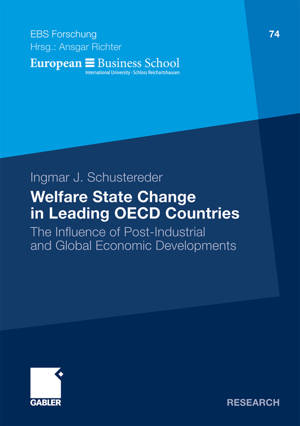
Je cadeautjes zeker op tijd in huis hebben voor de feestdagen? Kom langs in onze winkels en vind het perfecte geschenk!
- Afhalen na 1 uur in een winkel met voorraad
- Gratis thuislevering in België vanaf € 30
- Ruim aanbod met 7 miljoen producten
Je cadeautjes zeker op tijd in huis hebben voor de feestdagen? Kom langs in onze winkels en vind het perfecte geschenk!
- Afhalen na 1 uur in een winkel met voorraad
- Gratis thuislevering in België vanaf € 30
- Ruim aanbod met 7 miljoen producten
Zoeken
Welfare State Change in Leading OECD Countries
The Influence of Post-Industrial and Global Economic Developments
Ingmar Schustereder
€ 111,95
+ 223 punten
Omschrijving
1. 1 Research Scope Ever since the introduction of social insurance legislation beginning in the last th decades of the 19 century, social scientists have been interested in analyzing the causal forces behind the development of the modern welfare state. Precisely, for most of the period the academic debate has hereby mainly centered on the following qu- tions: Why was the welfare state founded in the first place? And which factors have 1 contributed to its rapid expansion in the aftermath of World War Two (WWII)? With the advanced capitalist welfare states beginning to face increasing ch- lenges from the mid-1970s onwards, academic research has recently shifted from providing explanations on the rise of the welfare state to understanding processes of welfare state adaptation. In general, advanced capitalist welfare states confront today two types of challenges: on the one hand, pressures from post-industrial devel- ments, and on the other hand, pressures from global economic forces (see Buti, Franco, and Pench, 1998, pp. 17-26). Following Pierson (2001a), the most severe "post-industrial pressures" (p. 80) involve ongoing processes of deindustrialization, population ageing, changing household structures, and welfare state maturation (pp. 82-83). Apart from these domestic challenges, advanced capitalist welfare states have recently also been affected by developments occurring in the global sphere. While processes of international economic integration had already resumed in the imme- ate aftermath of WWII, they have significantly intensified during the last four decades.
Specificaties
Betrokkenen
- Auteur(s):
- Uitgeverij:
Inhoud
- Aantal bladzijden:
- 222
- Taal:
- Engels
- Reeks:
- Reeksnummer:
- nr. 74
Eigenschappen
- Productcode (EAN):
- 9783834919014
- Verschijningsdatum:
- 26/03/2010
- Uitvoering:
- Paperback
- Formaat:
- Trade paperback (VS)
- Afmetingen:
- 148 mm x 210 mm
- Gewicht:
- 294 g

Alleen bij Standaard Boekhandel
+ 223 punten op je klantenkaart van Standaard Boekhandel
Beoordelingen
We publiceren alleen reviews die voldoen aan de voorwaarden voor reviews. Bekijk onze voorwaarden voor reviews.









